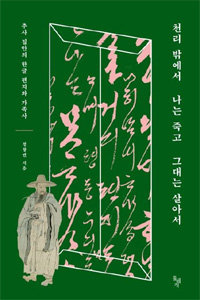Kim Jeong-hee’s polite letter to his wife
Kim Jeong-hee’s polite letter to his wife
Posted February. 29, 2020 07:50,
Updated February. 29, 2020 07:50

“I have my mind at rest after reading your letter. I had several chances to send a reply but couldn’t do so because writing is too hard. You must have been upset about this. The messenger must leave now. I wish you peace and happiness.”
Kim Jeong-hee (1786-1856) at the age of 32 wrote this letter in Korean to his family in Daegu in April 1818. Some may assume that the letter was sent to his father or mother because he blames himself for not sending a reply. But the recipient was his wife Lee. He always used the most honorary terms to his wife. His father Kim No-gyeong (1766-1837) did so as well.
The book interpreted 85 Korean letters of Kim Jeong-hee and his family into modern language. The letters do not reflect the convention of the time where women were treated as inferior to men and women had to manage all the house chores. The letters show that the men in Kim’s family actively participated in household affairs such as house chores, managing slaves, ancestral rites and marriages. They knew a lot about clothes and food, managed cloth and groceries and bore household duties themselves.
“I made dumplings on Changnyeong (his second son)’s birthday, but they weren’t that good. The buckwheat was as black as ink and we didn’t have kimchi to have them with. Please send me some buckwheat flour next time along with the recipe for buckwheat noodles. I will try again, but I am not so sure they would taste good. Send me enough cabbage leaves like last year.”
There is no trace of the taboo that men do not participate in work in the kitchen. The letters also show that a married daughter in the family visits her parents often.
“Men helped with house affairs in the late Joseon period,” said the author of the book, who is visiting professor at the Division of Culture Creativity in Korea University. The author has been writing books on disadvantaged groups in history. “Men were more of a household head rather than an overlord.”
Jong-Yeob JO jjj@donga.com
Headline News
- Med professors announce intention to leave hospitals starting Thursday
- Bridge honoring Sgt. Moon Jae-sik unveiled in Pennsylvania
- Chief of Staff Chung tells presidential secretaries to stay away from politics
- US FTC bans noncompete agreements
- N. Korea launches cyberattacks on S. Korea's defense companies







